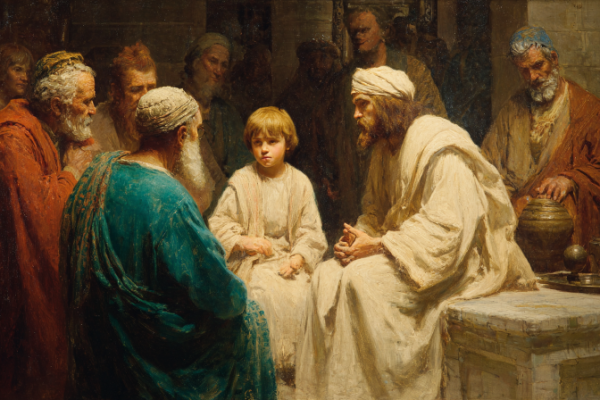Question
Gramps,
What did Jesus do from the time He was 12 until He began His ministry at 30?
Bernie
Answer
Bernie,
The Gospels of Matthew, Mark, Luke, and John provide the primary accounts of Jesus’ life, but they offer very little detail about His early years. The most notable event from His childhood is found in the Gospel of Luke, which recounts His visit to the temple at the age of 12. During this visit, Jesus engages with the teachers of the law, astonishing them with His understanding and answers (Luke 2:41-52). This moment is significant as it hints at His early awareness of His divine mission. However, after this event, the Gospels remain silent about His life until He begins His ministry at around 30 years of age.
The Gospels’ silence regarding Jesus’ early life can be attributed to several factors. First, the authors of the Gospels were primarily focused on His ministry, teachings, crucifixion, and resurrection, which they deemed most relevant to their audiences. The early Christian community was more concerned with the implications of Jesus’ teachings and His role as the Messiah than with the details of His childhood. As noted in the writings of Elder James E. Talmage, “the silence with which the early period of the life of Jesus is treated by the inspired historians is impressive.”
Moreover, the cultural context of the time may have influenced the narrative choices of the Gospel writers. In ancient Jewish culture, the focus was often on the adult life and accomplishments of individuals, particularly those who were seen as leaders or prophets. The lack of emphasis on Jesus’ childhood reflects this cultural norm, as the Gospels prioritize His teachings and miracles over personal anecdotes from His youth.
While the Gospels provide limited information, various theories and apocryphal texts have emerged over the centuries, attempting to fill the gaps in Jesus’ early life. These accounts often blend historical elements with legend, leading to a variety of interpretations.
Several apocryphal texts, known as the Infancy Gospels, claim to provide insights into Jesus’ childhood. These texts, such as the Infancy Gospel of Thomas and the Protoevangelium of James, contain miraculous stories about Jesus as a child, often portraying Him as a supernaturally gifted boy who performs miracles and demonstrates divine knowledge. For instance, the Infancy Gospel of Thomas describes Jesus creating birds from clay and bringing them to life, as well as cursing a boy who injures Him, leading to the boy’s death.
While these stories are captivating, they are not considered canonical by The Church of Jesus Christ of Latter-day Saints or most Christian denominations. The Church teaches that these accounts are often filled with “fictitious detail” and should be approached with caution. Elder Talmage cautions against the “puerile inconsistency” found in many of these narratives, emphasizing that they do not align with the reverent silence maintained by the Gospel writers regarding Jesus’ early years.
The silence surrounding Jesus’ early life has significant theological implications. It invites believers to reflect on the nature of His divine mission and the preparation He underwent before beginning His public ministry. According to the Joseph Smith Translation of the Bible, Jesus “grew up with his brethren, and waxed strong, and waited upon the Lord for the time of his ministry to come.” This suggests that Jesus was not only aware of His divine identity but was also in a process of spiritual growth and preparation.
The idea that Jesus may have known of His mission as early as age 12 is a compelling theory. It aligns with the notion that He was divinely appointed and prepared for His role as the Savior of humanity. This perspective encourages believers to consider the importance of personal growth and preparation in their own lives, drawing parallels between Jesus’ silent years and their own journeys of faith.
Another factor contributing to the scarcity of information about Jesus’ early life is the reliance on oral tradition in the early Christian community. Before the Gospels were written, stories about Jesus were passed down orally, often focusing on His teachings and miracles rather than His childhood. This oral tradition may have prioritized the aspects of Jesus’ life that were most relevant to the faith and teachings of the early Church.
As the early Christian community grew, the need for written accounts became apparent. However, by this time, the focus had shifted to the events surrounding Jesus’ ministry, crucifixion, and resurrection. The early Church was more concerned with establishing its beliefs and practices than with documenting the details of Jesus’ childhood. This shift in focus further contributed to the silence surrounding His early years.
Gramps









